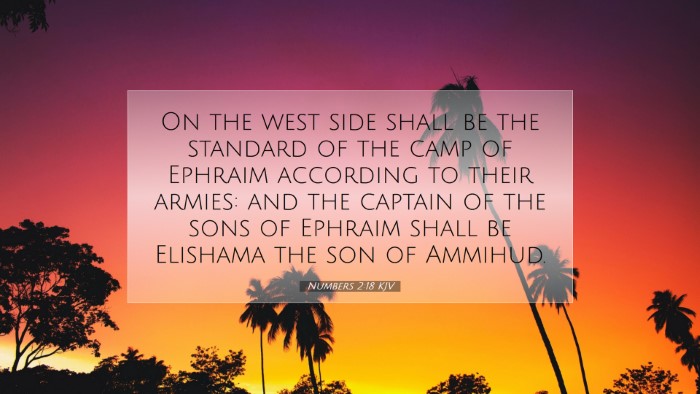Commentary on Numbers 2:18
Verse Overview: Numbers 2:18 states: “On the south side shall be the standard of the camp of Reuben, according to their armies: and the captain of the children of Reuben shall be Elizur the son of Shedeur.” This verse indicates the organization of the Israelite camp during their wilderness wanderings, with particular emphasis on the position and leadership of the tribe of Reuben.
Contextual Background
The Book of Numbers records the journey of the Israelites from Sinai to the Promised Land, detailing their organization, laws, and experiences. Central to this chapter is the arrangement of the tribes as they camp around the Tabernacle, reflecting God's order and presence among His people.
Key Themes in Numbers 2:18
- Tribal Organization: This verse illustrates the structure God imposed on Israel, demonstrating His desire for order and unity within the community. Each tribe had a specific location and role, indicative of their unique contribution to the whole.
- Leadership: The appointment of Elizur as captain underscores the importance of leadership in fulfilling God's mandates. His name signifies "God is my strength," emphasizing dependence on divine empowerment for leadership.
- Significance of Reuben: As the firstborn son of Jacob, Reuben's position bears significance. However, his right to leadership experienced challenges due to past indiscretions, reflecting God’s grace and sovereignty in leadership choices.
Insights from Public Domain Commentaries
Matthew Henry’s Commentary
Matthew Henry emphasizes how the arrangement of the camp reflects God's law of order. He notes that God does everything in a calculated and systematic manner; hence, the Israelites were commanded to camp by their tribes in an orderly fashion. Each tribe’s standard was not only a flag but a testimony of their identity and a reminder of God’s covenant with them.
Henry further discusses the relevance of the tribe of Reuben being stationed to the south, suggesting that their position may symbolize a balance of strength among the tribes. The inclusion of a captain also serves to remind the Israelites of the need for human leadership under God’s authority.
Albert Barnes’ Notes
Barnes points out that the precise design of the camp, including the placement of Reuben, serves practical purposes in terms of defense and unity during their travels. He notes that this organization signifies God’s providence in guiding and protecting His people.
Barnes also comments on the name of the captain, Elizur, highlighting its meaning. He draws attention to the characteristic of reliance on God’s strength, which should resonate with every leader and believer, illustrating that true leadership stems from divine inspiration and guidance.
Adam Clarke’s Commentary
Adam Clarke elaborates on the cultural implications of the tribal positioning, explaining how this structure reflects the identity and legacy of the tribes descending from the patriarchs. He suggests that this meant not just spatial organization but also the reinforcement of familial unity and heritage.
Clarke notes the historical context of Reuben’s birthright and how it affected the tribe’s standing among the other tribes. This historical narrative emphasizes themes of redemption and grace, revealing how God can still use flawed individuals and tribes for His purpose and glory.
Theological Reflections
In summarizing these insights, we recognize that Numbers 2:18 goes beyond mere organization; it touches on vital themes of leadership, identity, and God’s faithfulness. The ordering of the camp can be seen as a representation of the church today, where diverse gifts and callings contribute to the body of Christ while functioning under Christ’s lordship.
The portion of land allotted to Reuben also signifies the grace shown to him despite his shortcomings. For pastors and theologians, this serves as a reminder of the transformative power of God’s grace and how He calls individuals to leadership positions despite their pasts.
Practical Application
For modern readers, including pastors, students, and scholars, this passage encourages an examination of how we align with God’s order in our lives and communities. Reflecting on the themes of leadership and grace, it is vital to consider our role within our own communities and the way we support and uplift others in their God-given assignments.
Moreover, understanding the cultural and historical significance of these allocations enhances our faith and appreciation for God's meticulous design in our lives. Whether we lead or follow, each position is vital within God’s plan, and recognizing our identity in Him should inspire unity and purpose.
Conclusion
Numbers 2:18 serves as a powerful reminder that God cares about the order and structure of His people. Through the leadership of Elizur and the positioning of the tribe of Reuben, we are reminded of God's sovereignty, the importance of leadership, and the call to unity among believers. It encourages every believer to seek God’s strength in their leadership roles, ever mindful of their identity and calling in His grand design.


